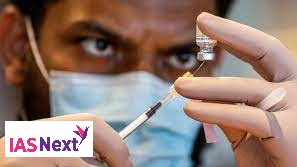CURRENT AFFAIRS
Get the most updated and recent current affair content on Padhaikaro.com
India’s patent waiver plan at WTO and issues associated
- IAS NEXT, Lucknow
- 10, Feb 2022

Reference News-
A proposal was taken up at the World Trade Organisation (WTO) negotiations, in 2020, to “temporarily waive” intellectual property rights (IPR) held, by primarily Western countries, on vaccines, therapeutics and diagnostics for covid-19. This proposal was co-authored by India.
- Now, India runs the risk of being excluded from this proposal.
Background:
India and South Africa had jointly sponsored a proposal in October 2020 and this was updated, with representation from several low– and middle–income countries — though with the notable omission of China — to expand the scope of the waiver to “all health products and technologies” and to have the waiver in place for at least a year.
What’s the issue?
A small group of WTO members are “discussing suggestions” to exclude drug manufacturers in India and China — two major, global suppliers of medicine — from prospective waivers to IPR obligations that result from the Trade Related Intellectual Property Rights (TRIPS) which WTO members are committed to uphold.
- Also, Manufacturers want to “limit” any benefits of the waiver only to African countries, and not pave the way for Indian manufacturers who, with their large production capacities, would easily undercut Western competitors.
Why is there an opposition to the waiver? What are the arguments against it?
Waiving of intellectual property rights will neither lead to increased production of vaccines or increased deployment nor practical solutions to fight the virus of COVID-19 vaccines since IP is not the barrier.
Waiving of intellectual property rights could impact patient safety by opening doors for counterfeit vaccines to enter the supply chain.
Need of the hour:
Our top most priority should be to address the supply side constraints, including IP barriers, to augment the manufacturing of vaccines, therapeutics and diagnostics, essential for treatment, prevention and control of the ongoing pandemic.
What does the intellectual property waiver for Covid-19 vaccines mean?
The IP waiver might open up space for production of Covid vaccines with emergency use authorisations (EUA) — such as those developed by Pfizer, Moderna, AstraZeneca, Novavax, Johnson & Johnson and Bharat Biotech — on a larger scale in middle-income countries.
- Most production is currently concentrated in high-income countries; production by middle-income countries has been happening through licensing or technology transfer agreements.
What are patents and IP rights?
A patent represents a powerful intellectual property right, and is an exclusive monopoly granted by a government to an inventor for a limited, pre-specified time. It provides an enforceable legal right to prevent others from copying the invention.
Patents can be either process patents or product patents:
- A product patent ensures that the rights to the final product is protected, and anyone other than the patent holder can be restrained from manufacturing it during a specified period, even if they were to use a different process.
- A process patent enables any person other than the patent holder to manufacture the patented product by modifying certain processes in the manufacturing exercise.
Patent regime in India:
India moved from product patenting to process patenting in the 1970s, which enabled India to become a significant producer of generic drugs at global scale, and allowed companies like Cipla to provide Africa with anti-HIV drugs in the 1990s.
- But due to obligations arising out of the TRIPS Agreement, India had to amend the Patents Act in 2005, and switch to a product patents regime across the pharma, chemicals, and biotech sectors.
What is the TRIPS Agreement?
The TRIPS agreement was negotiated in 1995 at the WTO, it requires all its signatory countries to enact domestic law.
- It guarantees minimum standards of IP protection. Such legal consistency enables innovators to monetise their intellectual property in multiple countries.
- In 2001, the WTO signed the Doha Declaration, which clarified that in a public health emergency, governments could compel companies to license their patents to manufacturers, even if they did not think the offered price was acceptable.
- This provision, commonly referred to as “compulsory licensing”, was already built into the TRIPS Agreement and the Doha declaration only clarified its usage.